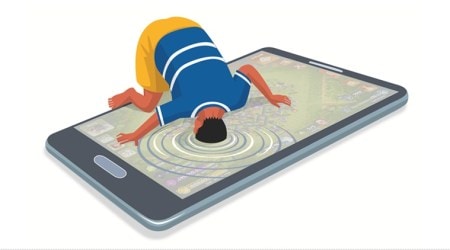 Ayushmann Khurrana talks about his exposure in Bollywood.
Ayushmann Khurrana talks about his exposure in Bollywood.
Actor Ayushmann Khurrana, 32, on his middle-class upbringing, why he can pull off playing the boy next door and addressing sexual issues through his films.
You came on the scene at 17 with MTV Roadies and it’s been a long ride since. Did you ever think a reality show about riding bikes would have made you a household name?
Back in the day, Roadies was very different. I was in season two. It was just travel and adventure from Point A to Point B, especially for the first three seasons. Of course, now, for the TRPs, you need that masala, and human conflict is very important, too. In my year, we were a bunch of decent kids, not the backbencher variety. So, Roadies wasn’t necessarily looked down upon by intelligent viewers.
When did you know that you wanted to get into films?
Always. I’d say it was probably when I was five or six years old. I went to a convent school, St Johns, in Chandigarh, and I did English theatre there. We had a school production of The Merchant of Venice for the annual function in the fifth standard and I played Shylock. Then, there was another production of the Andrew Lloyd Webber musical, Joseph and the Amazing Technicolor Dreamcoat. I played one of the brothers and I sang, too.
But it was only in college that I started to take acting more seriously. I was doing Hindi theatre then and all my public speaking events were in Hindi as well. I studied English Literature but I was the only guy from the department who represented the college at Hindi debates. Being bilingual gave me an edge.
You have managed to carve a niche for yourself as an “Everyguy” in Bollywood, which is quite different from the Everyman somebody like Nawazuddin Siddiqui can play. When and how did you start working on that?
We used to travel to different parts of the country with the college theatre group. Travelling to small and big cities at 18-19 years of age really gave me a lot of exposure, I got to see how people across India live. Hindi theatre really does connect you with the masses. So does radio, which is where I went next. Most of the callers are from lower middle-class income groups. Gadi mein baithne wala aadmi kabhi radio pe call nahin karta (A man sitting in a car does not call a radio show). He will listen to the songs, but he won’t take something like the radio as seriously as some other people will. That experience really gave me a window into understanding how mass middle-class India thinks.
You wouldn’t describe yourself as middle-class, would you?
No, I’m not from the middle class but I’ve had a middle-class upbringing. I went to a good school and we were very comfortable, but my father wouldn’t let me and my brother have an air-conditioner in our room for the summer, lest we get spoiled. I was given a bike to go around because he believed I should save up and buy my own car. But more than that, in my family, there’s a lot of disparity. I have super-rich relatives to not well-off ones; so, I always have these references. Dum Laga Ke Haisha was a very different film from what I’d done before, but I have relatives who live in a small village in Punjab, who are not so dissimilar from Prem’s family in Haridwar. Acting is so much about observation, and I’ve had the opportunity to do that all my life.
What do you think it is about you that has clicked with audiences across mediums — MTV, radio, award shows, mainstream Bollywood.
Early exposure, for sure. I started young, it definitely gave me an edge. I was more of a method actor earlier. Even for radio, I’d prep for a show three hours in advance.
But that’s not really answering the question. You seem reluctant to say nice things about yourself.
Haha, I think I’m very earnest as an actor. I have been told that I’m likeable, although I can’t say that for myself. When I asked Shoojit Sircar why he picked me to play a sperm donor in Vicky Donor, he said, ‘You’re a very likeable person and have an innocence. For this kind of subject, we need innocence.’ He was right, because if the protagonist of that film was cocky, and not innocent, it would not have worked. Vicky would have been a creep then. The same goes for Shubh Mangal Savdhan — if Mudit doesn’t have a certain kind of innocence in a movie that talks about erectile dysfunction, then it can go a little haywire.
You played a sperm donor in your debut film and you’re addressing erectile dysfunction in your latest film. You’ve covered some serious reproductive/sexual issues so far. What made you say yes to this film?
The irony of the situation in Shubh Mangal Savdhan is what attracted me to it. I’m not an impulsive person but I choose my films instinctively. I met the director, Prasanna, at YRF three years ago and he told me about this film he’d made, Kalyana Samayal Saadham, which was being called the Vicky Donor of the south. I couldn’t quite believe it. It took nearly 50 drafts before the final script was approved. I’ve not seen the Tamil original but the Hindi version is completely different — only the sperm is the same (laughs).
Are you worried that you might become the poster boy for films with larger social messages?
Oh no. Meri Pyaari Bindu and Bareilly Ki Barfi weren’t social message wale films, they were just fun. And my next, with Sriram Raghavan, is a thriller. I can’t say much about it, but I’m very excited. I’ve always wanted to do a thriller and I had received scripts before, but I wanted to work with the master of the genre. We’ve finished shooting 40 per cent of the film. The film is set in Pune and some parts of London. My co-actors are Tabu and Radhika Apte. I’m a huge Tabu fan and it’s been absolutely amazing working with her. I knew Radhika from before. This is an actor’s film, because Sriram can’t work with non-actors. That’s just the way he is, he’ll give you a lot of room for improvisations and then you just go for it.

As for your personal life, do you still have a long-distance marriage?
We did, but we’re all in the same place now. It’s kind of hard, otherwise. Tahira, my wife, is the first girl I fell in love with and dated. But when I started getting famous, all the female attention and adulation went to my head and I broke up with her. I went running back to her within a year. We got married in 2008. I was 24 then.
Let’s talk about your screen wife in two films, Bhumi Pednekar. You share an excellent chemistry with her.
In Dum Laga Ke Haisha, the love story started in the end, when I picked her up, and Kumar Sanu was also singing, and we kissed, so sab sahi tha. I think people wanted to see more of their romance. Here, we’re in love from the first minute, but the milieu is different, and so is our chemistry. Then comes the gents’ problem.
What’s your dream script? Have there been any films you watched recently and wanted to be a part of?
I don’t know, really. I didn’t think I’d play a sperm donor in my first film, even though I have donated my sperm in Allahabad in 2004; it was one of the Roadies tasks. Out of five, three guys with ‘good’ samples were selected (laughs).
But I have some favourites — I would love to play Shah Rukh Khan’s character in Kabhi Haan Kabhi Naa, Aamir Khan’s character in Jo Jeeta Wohi Sikander, Amitabh Bachchan’s in Shakti, Ranbir Kapoor’s character in Rockstar. There’s something about the underdog that I have always loved, it works for me.

